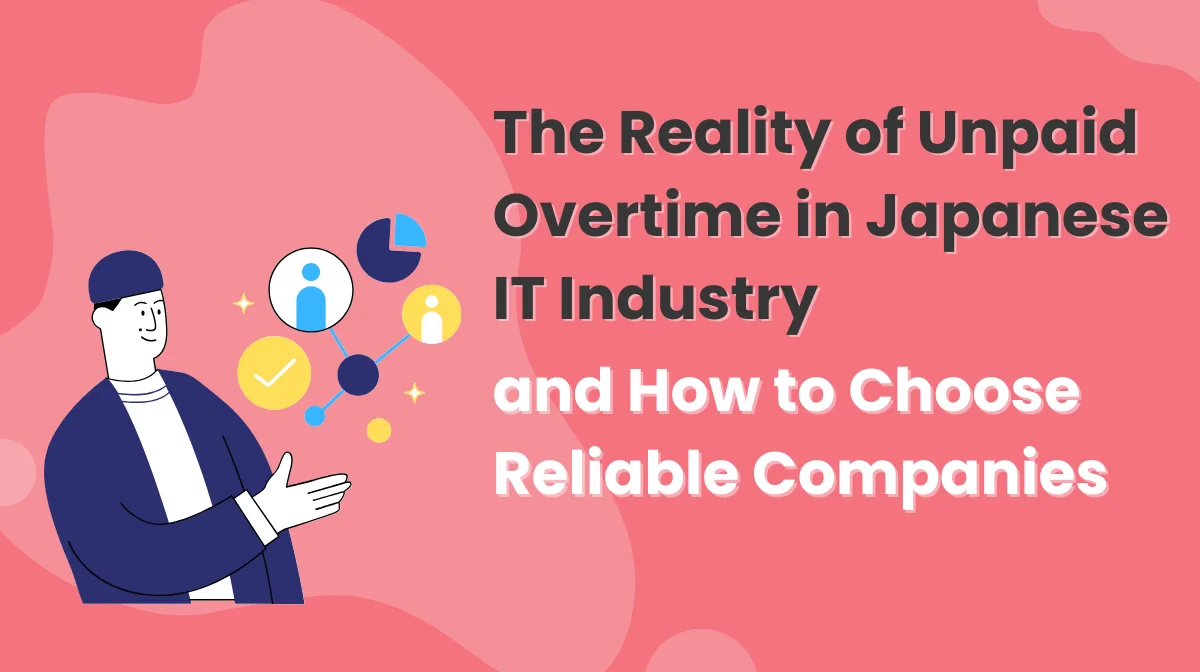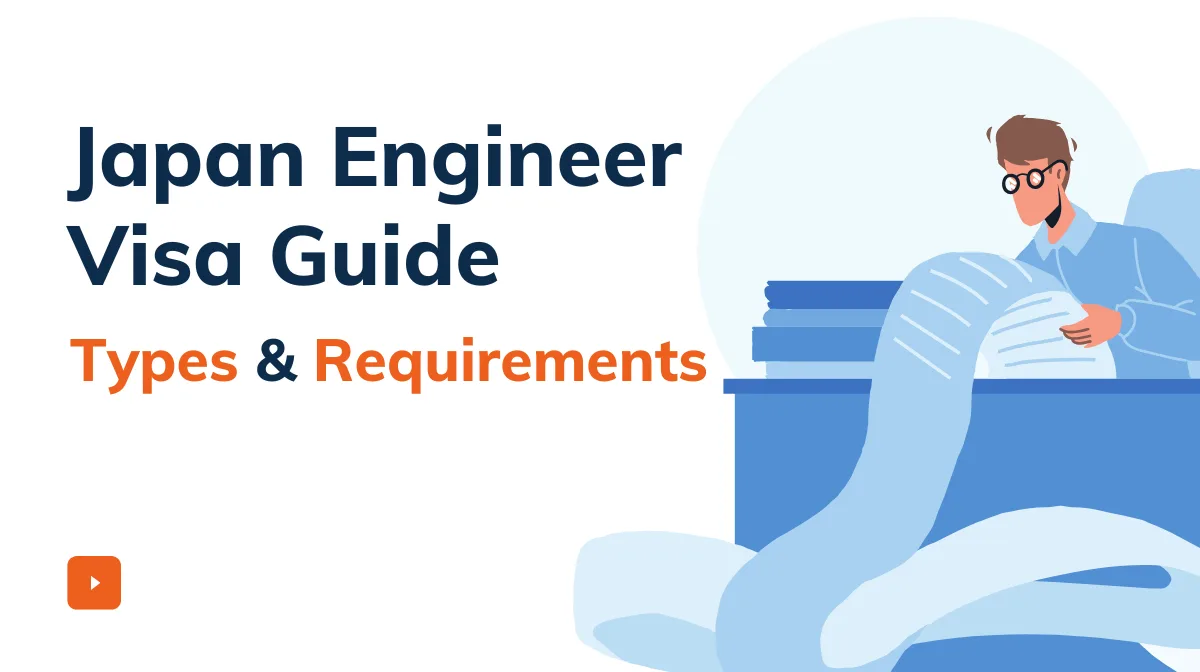Japan’s IT industry has a serious problem with “service overtime” – unpaid overtime work that affects thousands of employees. For foreign engineers, this creates unique challenges including visa complications and language barriers.
This guide uses real data to explain the unpaid overtime situation in Japanese IT industry and shows you how to find reliable companies.
- How 30% of Japanese IT workers face unpaid overtime risks.
- Why subcontracting creates unpaid overtime problems.
- Which questions identify reliable IT companies in Japan.
1. The Current Reality of Unpaid Overtime in Japanese IT Industry: Data Analysis
Let’s examine specific data to understand how widespread unpaid overtime is in Japanese IT companies.
Monthly Average of 15.5 Hours: The Reality Behind Unpaid Overtime
According to the Ministry of Health, Labour and Welfare’s Monthly Labour Statistics Survey, Japan’s information and communications industry averages 15.5 hours of overtime monthly. This significantly exceeds the 10-hour national average across all industries.
More concerning is that unpaid overtime (overtime work without compensation) is rampant in actual workplaces. Private surveys report that approximately 30% of IT industry workers perform unpaid overtime regularly.
Overtime Beyond the Karoshi Line and Workers’ Compensation Recognition
When someone becomes ill, develops mental health issues, or dies from overwork, this can be recognized as “industrial accident compensation (workers’ compensation)” The “karoshi line” represents dangerous working hours – monthly overtime exceeding 80 hours. Even with less than 80 hours monthly, prolonged excessive work leading to illness may qualify for workers’ compensation.
IT Industry Culture and Work Practices That Lead to Overwork
Japan’s IT industry includes many startups where long working hours become normalized within entrepreneurial company cultures. Some companies use performance-based evaluations or flexible working arrangements to justify excessive hours while keeping overtime payments unclear.
Additionally, some companies misuse the “discretionary labor system” (paying predetermined hours rather than actual hours worked) to avoid adequate overtime compensation, even when legal conditions aren’t met.
2. Structural Reasons Behind Unpaid Overtime in Japanese IT Industry
Several structural problems within Japan’s IT industry create conditions where unpaid overtime becomes widespread.
Multi-tier Subcontracting and Schedule Pressure
Japanese IT projects typically involve prime contractors distributing work to multiple subcontractors. Lower-tier subcontractors face the tightest deadlines and heaviest pressure, often resulting in unpaid overtime to meet impossible schedules. Foreign engineers should understand where prospective companies sit within these multi-tier structures.
The “Goodwill Response” Culture
When project specifications change mid-development, Japanese companies often expect “goodwill responses” – completing additional work without compensation or deadline extensions.
This implicit cultural rule can be difficult for foreign engineers unfamiliar with Japanese business customs to understand and creates extended overtime situations.
Incorrectly Implemented Fixed Overtime Systems
Many companies misuse fixed overtime pay systems. While these should pay additional compensation when actual overtime exceeds the fixed amount, some companies treat the fixed payment as covering unlimited overtime hours.
Companies without accurate attendance management require special attention since they cannot maintain evidence proving overtime compensation obligations.
■Related Reading
Understanding workplace culture is crucial for navigating these structural issues effectively in Japanese companies.
■日本でエンジニアとしてキャリアアップしたい方へ
海外エンジニア転職支援サービス『 Bloomtech Career 』にご相談ください。「英語OK」「ビザサポートあり」「高年収企業」など、外国人エンジニア向けの求人を多数掲載。専任のキャリアアドバイザーが、あなたのスキル・希望に合った最適な日本企業をご紹介します。
▼簡単・無料!30秒で登録完了!まずはお気軽にご連絡ください!
Bloomtech Careerに無料相談してみる
3. Additional Risks Faced by Foreign Engineers

Foreign engineers face unique challenges when dealing with unpaid overtime in Japan’s IT industry.
Visa Renewal and Unpaid Overtime: Risk of Residence Status Cancellation
Foreign engineers typically obtain work visas with residence periods ranging from 3 months to 5 years requiring regular renewal. Work visas become difficult to renew if working conditions violate the Labor Standards Act, as this constitutes illegal employment.
The Labor Standards Act defines working hours as “8 hours per day, 40 hours per week” Companies can extend these limits through “36 Agreements” allowing up to 45 hours monthly and 360 hours yearly of overtime. Discrepancies between actual and reported working hours create unpaid overtime risks that may affect visa renewal.
Language Barriers with Japanese-Only Attendance Systems
Many companies require advance “overtime applications” when working beyond regular hours. These applications must specify reasons, work content, and scheduled hours for approval.
Many companies use online attendance management systems supporting only Japanese, creating language barriers that may result in unapproved overtime or delayed applications, potentially leading to unpaid overtime situations.
■Related Reading
Visa complications from overtime violations can seriously impact your legal status in Japan.
3. Unpaid Overtime is Illegal: Calculating and Claiming Overtime Pay

Making employees work overtime without payment violates Japanese labor law. Understanding your rights and claiming procedures is essential.
Premium Wage Calculations: Basic Pay × 1.25-1.5
Overtime Labor Wage Calculation
- Basic hourly wage × 1.25-1.5 × overtime hours worked
When exceeding statutory working hours (8 hours daily, 40 hours weekly), you receive 25% premium overtime pay. When monthly overtime exceeds 60 hours, you receive 50% premium pay.
Night Work Wage Calculation (10 PM – 5 AM)
- Basic hourly wage × 1.25 × night work hours
Holiday Work Wage Calculation
- Basic hourly wage × 1.35 × holiday work hours
Companies providing fixed overtime pay must pay additional premium wages when actual overtime exceeds fixed overtime hours. Even when actual hours are shorter than fixed overtime settings, the predetermined amount is still paid without reduction. Overtime pay differences cannot be carried over to offset the following month.
Claiming Process: Evidence Collection → Internal Claim → Labor Standards Office/Court
Steps to Claim Unpaid Overtime
- Collect evidence (company clock photos, PC log histories, emails, work schedules)
- Create and submit a claim document to your company
- Contact Labor Standards Inspection Office or consult a lawyer if no response
Companies not paying overtime often have inadequate attendance management. Regularly photograph company clocks, maintain PC logs, and save emails as evidence of overtime hours. The claiming period is 3 years, so raise issues as early as possible.
■Related Reading
When changing jobs, salary negotiation skills become essential for securing fair compensation packages.
■日本でエンジニアとしてキャリアアップしたい方へ
海外エンジニア転職支援サービス『 Bloomtech Career 』にご相談ください。「英語OK」「ビザサポートあり」「高年収企業」など、外国人エンジニア向けの求人を多数掲載。専任のキャリアアドバイザーが、あなたのスキル・希望に合った最適な日本企業をご紹介します。
▼簡単・無料!30秒で登録完了!まずはお気軽にご連絡ください!
Bloomtech Careerに無料相談してみる
4. How Foreign Engineers Can Identify Reliable Companies with Zero Unpaid Overtime
Most companies effectively reducing overtime and unpaid overtime utilize comprehensive attendance management systems, business efficiency tools, and task management systems.
Checking Attendance Management System Completeness
Reliable attendance management systems record clock-in and clock-out times in real-time both offline and online, enabling accurate attendance tracking. Since overtime hours are properly recorded, companies can reduce unnecessary overtime, and alert functions prevent unpaid overtime by notifying about overtime limits.
Foreign engineers should verify during interviews whether attendance systems support multiple languages.
Business Efficiency Initiatives
Companies serious about preventing unpaid overtime invest in task automation tools for simple work, allowing focus on core business and ultimately reducing overtime hours. Task management tools visualize work progress, enabling smooth progression with correct priorities and eliminating unnecessary overtime.
Key Points to Confirm During Interviews
Essential Questions for Foreign Engineers
- “What is the status of your 36 Agreement and overtime hour limits?”
- “What are the details of your fixed overtime pay system – how many hours are included and how do you handle excess hours?”
- “What is the language support status of your attendance management system?”
- “What are the actual monthly average overtime hours and overtime payment records?”
- “What systems do you have for explaining working conditions to foreign personnel?”
■Related Reading
Recognizing red flags early can help you avoid companies with problematic overtime practices.
5. Avoiding Unpaid Overtime in Japanese IT Industry: Critical Points for Foreign Engineers

Foreign engineers working in Japan’s IT industry must be aware of unique risks including visa renewal complications and language barriers beyond standard labor issues.
During interviews, don’t hesitate to confirm details about 36 Agreement contents, attendance system language support, and actual overtime hours. Companies providing appropriate working environments enable you to build careers where you can utilize your skills with confidence.
6. Choosing Reliable Companies in Japan’s IT Industry
Unpaid overtime affects 30% of workers in Japan’s IT industry, but foreign engineers can protect themselves through careful employer selection and legal awareness. Focus on reliable companies that offer multilingual attendance systems, clear 36 Agreement limits, and transparent overtime policies.
Don’t hesitate to ask specific questions during interviews and watch for red flags. Your visa status depends on legal employment conditions – never compromise your basic labor rights when building a career in Japan’s tech sector.
■Related Reading
Planning a successful job change requires understanding the complete process and timeline in Japan.






















